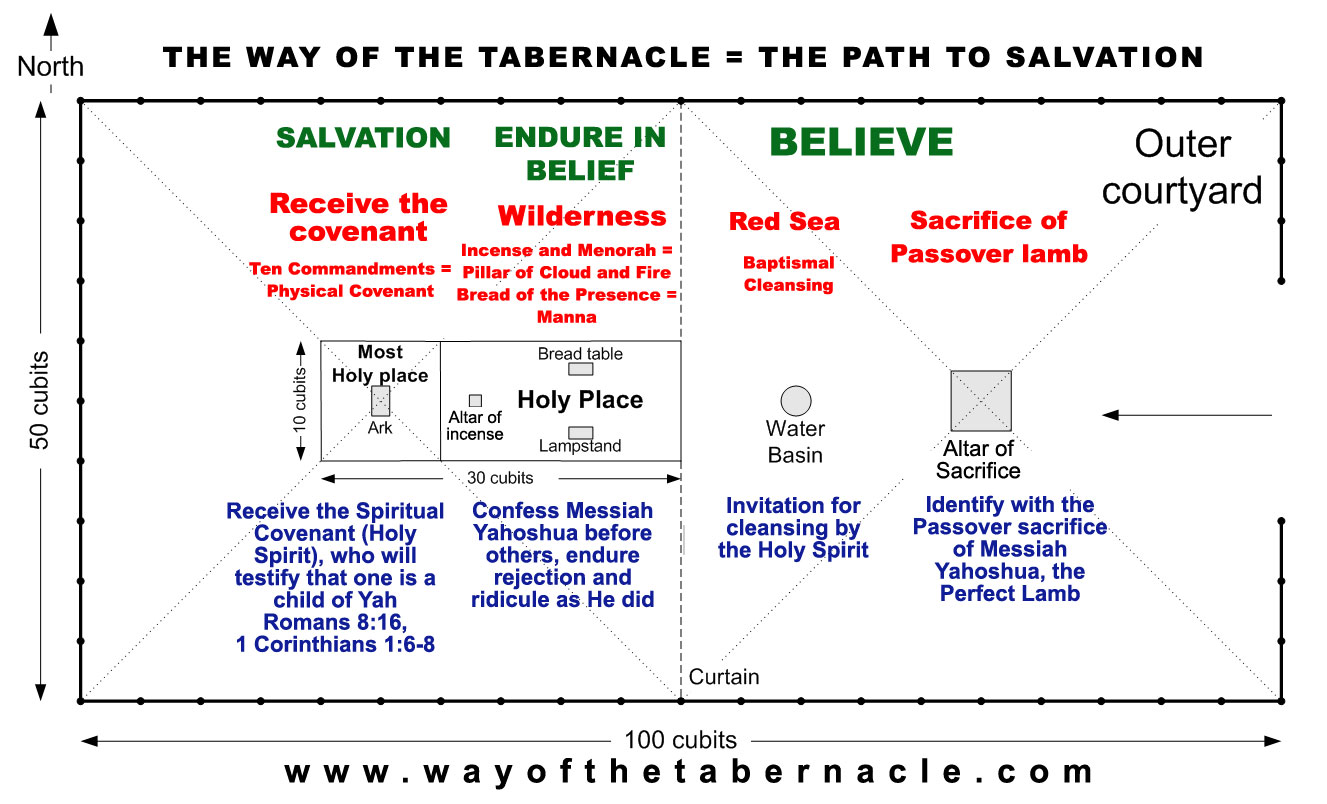bETWEEN bELIEF AND sALVATION
For in the case of those who have once been enlightened and have tasted of the heavenly gift and have been made partakers of the Holy Spirit, and have tasted the good Word of Yah and the powers of the age to come, and then have fallen away, it is impossible to renew them again to repentance, since they again crucify to themselves the Son of Yah and put Him to open shame. Hebrews 6:4-6
Only those who possess the Holy Spirit are justified in Yah's eyes, for the Spirit is Yah's eternal seal of redemption upon a believer (In Him, you also, after listening to the message of truth, the gospel of your salvation—having also believed, you were sealed in Him with the Holy Spirit of promise, who is given as a pledge of our inheritance, with a view to the redemption of Yah’s own possession, to the praise of His glory. Ephesians 1:13-14). Those who don't understand the role and authority of the Holy Spirit often mistake our opening passage to mean that those who have been saved can lose their salvation, and they often misinterpret passages dealing with “commandments” or “sins” to bolster their false teachings.
Of course, as we've discussed previously, there is only one sin for which anyone will be sent to hell, and that is the sin of unbelief in Yahoshua the Messiah; but, those in error on this often conflate justification, which is an eternal decree of adoption by the Almighty, with the bride's responsibility to sanctify herself (make herself holy) by crucifying her flesh. They confuse inheritance and reward by not understanding the difference between the kingdom of heaven and the kingdom of Yah.
Since the creation of man, salvation has been the gracious response of the Holy Spirit to a person's faith—the faith that saved Abraham is the same faith that saves the bride today, and will save the tribulation saints in the days to come, albeit, with the tribulation saints, it will not happen until the point of their deaths. As we're taught in James 1:2-4, “Consider it all joy, my brethren, when you encounter various trials, knowing that the testing of your faith produces endurance. And let patience have its perfect result, so that you may be perfect and complete, lacking in nothing.” But, what is it we are to wait for, or endure?
James says that we are to “let patience have its perfect work so that we might be perfect and complete, lacking nothing.” From the Greek, “its perfect work” is more properly stated as “her perfect work,” and that is important, as the Holy Spirit is associated with the bride. In the Passover Seder, it is the woman of the house who lights the candle, which is symbolic of inviting the presence of the Holy Spirit. It is the bride whom the Holy Spirit indwells.
It is vital to understand that James is describing that period between belief (our proper response to the Holy Spirit's drawing) and salvation (the Holy Spirit's response to that belief). It is those who patiently maintain faith (in what? That they will receive the completed work of the Holy Spirit), who ultimately receive Him, and that is what makes them “perfect and complete, lacking nothing.” The fact that belief is a response precipitated by the Holy Spirit is explained in John 6:44 (“No one can come to me unless the Father who sent me draws him. And I will raise him up on the last day”).
The “Church” Model and the Samaritans
Most churches teach a model of salvation that falls short of biblical truth. In the way of the tabernacle (the priestly progression from the gate to the Holy of Holies), the priest would enter and approach the brazen altar (symbolizing the first step of atonement—the sacrifice), and then wash himself in the laver (symbolizing purification, or the “Baptism of John”). This is where the “church” typically stops, declaring that one who has believed and has been baptized by water is saved—many even going on to declare, “And don't ever let anyone tell you that you are not saved.” What foolishness! No preacher has the ability to look on another person's heart, so salvation is not something a preacher could ever declare. That is fully the responsibility of the Holy Spirit.
It is after the altar and the laver that the priest would enter into the Holy Place, which housed the lighted menorah and the altar of incense—symbolizing the leading of the Holy Spirit, and the bread of the presence, symbolizing the Holy Spirit's nourishment. What is most often preached today stops short of ever entering the Holy of Holies, and thus, receiving the Holy Spirit—making it an incomplete gospel. The symbolic progression from the laver to the Holy of Holies is a period of patient waiting—and what does the faith that is necessary to exercise “patient waiting” produce? Perfectness and completeness—possession of the Holy Spirit. Those first two steps in the progression are exactly what the Samaritans in Acts 8 had done before Peter and John arrived to share the Holy Spirit with them.
According to most “churchian” doctrine, Peter and John were unnecessary, because the Samaritans had believed and had been baptized in the name of the Son of Yah, so they had fulfilled all the requirements necessary to be deacons and elders (as long as they started tithing at least 10% of their incomes to the various “church” programs). What is left out of the model is the most important aspect—the eternal seal of redemption.
Christ and the Disciples
Christ explained to His disciples that when He left them, He would send them His Holy Spirit (“And I will pray the Father, and He will give you another Helper, that He may abide with you forever—the Spirit of truth, whom the world cannot receive, because it neither sees Him nor knows Him; but you know Him, for He dwells with you and will be in you.” John 14:16-17). At this point, the Holy Spirit had been with the disciples (for He was in Christ), and He had taught them and guided them, but, He was not yet in them.
The disciples went through the Passover (crucifixion), the Feast of Unleavened Bread (burial), and the Feast of Firstfruits (resurrection), but had to wait until the Feast of Weeks, or Pentecost, to receive the Covenant. That is how Satan was able to enter Judas, for the Holy Spirit was not in any of them. Obviously, Judas had been led by the Holy Spirit just like the rest of the disciples, but he did not exercise patience during the trying of his faith—he faltered before he was made “perfect and complete, lacking in nothing,” which would have been the receiving of the Holy Spirit. It is also why Christ told Peter that Satan had demanded permission to sift them like wheat (Luke 22:31).
There is vast significance in the disciples receiving the Covenant of the Holy Spirit on that specific day (Feast of Pentecost), for the observance of that feast was, historically, the commemoration of the Ten Commandments being given to Moses. The Hebrew children had also gone through the Passover, but it wasn't until seven Sabbaths plus a day after the Passover (the calculation for the Feast of Weeks) that they received their covenant, or confirmation, from Yah.
The Seal of Redemption
The Holy Spirit is described as Yah's “seal of redemption.” Once the king's decree is sealed (stamped with his signet), it is legally binding. When the Holy Spirit, who is that seal, is drawing, teaching, and guiding an individual, the King's decree is being written—but it has no eternal significance until His seal has been placed upon it. It is during the writing of that decree—the leading of the Holy Spirit—that it is essential to wait upon Him, to allow one's faith to be tried by confessing Messiah before men; for, that will produce the patience necessary to endure—and that is the faith by which the decree will be sealed. And, when the decree is sealed, “The Spirit Himself bears witness to our spirit that we are the children of Yah” (Romans 8:16).
At that point, redemption is eternally decreed, and, as Christ said in John 10:28, “I give them eternal life, and they will never perish, and no one will snatch them out of my hand.” This is where the preachers of the law get it all wrong. When the Messiah says that “no one will snatch them out of my hand,” that includes every person His Spirit indwells. Once someone is sealed for redemption, there is nothing he can do to change that eternal decree—his salvation is not based on anything he does or does not do; so, one who preaches that obeying the “Torah” is the requirement for entrance into heaven is teaching “another gospel,” and is actually preaching condemnation upon himself, for he makes himself a hypocrite, being unable to fulfill the demands of the written law, but attempting to justify himself through it (which is a violation of Romans 8:33-39). He also diminishes the work of Christ and rejects the role and authority of the Holy Spirit.
Those who rely wholly on Christ for their redemption, and understand the sealing of that redemption by the Holy Spirit, do not look to their works for justification before Yah, for they know that it is not even remotely possible to justify oneself before Him with works. Will the person who possesses the Holy Spirit strive to please Yah and not grieve His Holy Spirit? He should, but it is not always guaranteed that he will. That is why Paul taught the Corinthians that some of them were sick and had died early. For one who possesses the Holy Spirit, the denial of the flesh is what determines heavenly reward, not heavenly entrance, and that's why there are two groups described as being in heaven (Revelation 22:14-15), but one group has access to the sanctuary in the New Jerusalem, and one group doesn't. One group crucified its flesh, and the other group didn't.
But, for those who are led by the Spirit after being drawn to belief in Yahoshua the Messiah, and then lose patience waiting for the Spirit to confirm them, they risk being in neither of those groups, for having known the truth, but then not enduring in faith, coming back again becomes more difficult. For them, their decrees were being written, but, by not enduring, the decrees never receive the King's seal. Eventually the unsealed decree will be rejected, it will not be rewritten, and it will not receive the seal. The door will be closed for eternity.
Conversely, those who have received the Holy Spirit are not able to fall away, for that would require the removal of the Holy Spirit, and that would make the death of Christ an open shame—powerless over the deeds of man. Moreover, Yah would have previously known the “falling away” would happen, and it would make Him a fool and a liar, since His Spirit is the One who seals a person for redemption, and He could never seal someone for redemption whom He knew would ultimately not be sealed for redemption.
So, belief is created through the drawing of the Holy Spirit, but it is our faith—that “He who began a good work in us will see it through to completion (Philippians 1:16)”—that results in the seal of redemption being placed within us. So, it is not only the drawing, the teaching, and the leading, it is also the patient waiting that ultimately yields the reward. And, what does Yah's Word say about those who wait on Him?
But they that wait upon Yah shall renew their strength; they shall mount up with wings as eagles; they shall run, and not be weary; and they shall walk, and not faint. Isaiah 40:31
See also: How Do You Know You Are Saved?
Excerpted from "From Christian to Believer."



Written by Dean Haskins for Way of the Tabernacle. Reproductions with proper attribution are allowed and encouraged.
Salvation
Traditions
Other Truths
But now in Yahoshua the Messiah you who formerly were far off have been brought near by the blood of Christ. For He Himself is our peace, who made both groups into one and broke down the barrier of the dividing wall, by abolishing in His flesh the enmity, which is the Law of commandments contained in ordinances, so that in Himself He might make the two into one new man, thus establishing peace, and might reconcile them both in one body to Yah through the cross, by it having put to death the enmity. Ephesians 2:13-16




